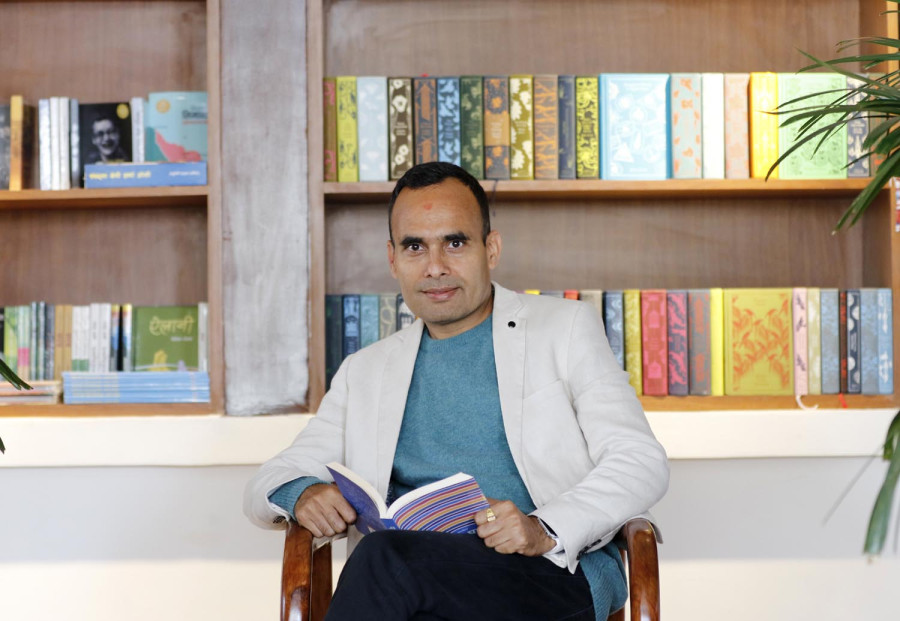Books
Literature helped me understand socio-political issues
Bikram Timilsina, an interdisciplinary researcher and former radio host, discusses books and international relations.
Sanskriti Pokharel
Bikram Timilsina is the chair and research fellow of the Asian Institute for Advanced Research (AIFAR), Kathmandu. He is an interdisciplinary researcher with expertise in politics, geopolitics, climate change, peace processes, and social inclusion. He holds a PhD in politics and international relations from Griffith University, Australia and two master’s degrees in International Studies and English.
Timilsina’s passion for reading literary books began in childhood. During his school years in Nuwakot, he was driven to read more. Despite its proximity to Kathmandu, Nuwakot lacked library access, leaving him without the opportunity to explore his interest in books.
Reflecting on his early years, Timilsina shares, “We formed a group of friends under the Pratibha Bidyarthi Manch, a youth student club we established. Through initiatives like organising the Deusi Bhailo programme, we raised funds to set up a library in our village.”
He ran a literary show on Radio Sagarmatha from 2004 to 2014. This passion paved the way for his Gajal collection, ‘Ali Ali Chot Deu’, published in 2006. Moreover, he has published articles on national and international platforms.
In this conversation with the Post’s Sanskriti Pokharel, Timilsina discusses how he balances academic readings with literary books.
Do you read for knowledge or comfort?
I don’t usually choose books based on preconceived expectations. Instead, I rely on a few personal criteria when selecting what to read. At times, books and their characters inspire me; other times, I turn to them for sheer joy and enjoyment. My current interests often shape my book choices. If researching the Nepal-India relationship, I lean toward books that align with that topic. In this way, my reading becomes a source of knowledge and comfort while mirroring my intellectual interests and current priorities.
How do you balance academic readings with literary books as an interdisciplinary researcher?
As an interdisciplinary researcher, balancing academic readings with literary books can be challenging. I often turn to literature during breaks from academic work, finding it a refreshing escape. However, I must admit that lately, I’ve felt somewhat disconnected from literary reading.
Several recently purchased literary books remain untouched, awaiting the time and attention they deserve. The demands of my professional commitments and academic research have made it challenging to dedicate time to leisurely reading.
To address this, I’m considering reserving my weekends—Saturdays and Sundays—exclusively for literary exploration. This approach will help me better balance academic pursuits with the joy of reading literature.
How did you go from earning a degree in English to International Relations?
I completed my first Master’s degree in English in 2007. Over time, I began developing a deeper awareness of political and current affairs. As I became more informed, I reflected on Nepal's challenges, questioning why the country struggles to progress, why politics is often dismissed as a ‘dirty game’ and what changes are necessary for a positive transformation.
As a citizen, my curiosity expanded beyond literature. I felt compelled to understand Nepal's political, social, and geographical issues. I was impacted by the country’s fragile position between two powerful neighbours and its struggle to find stability during the Comprehensive Peace Accord. Nepal was still wrestling with conflict then, and the dream of lasting peace felt distant.
These reflections inspired a strong desire to contribute to peacebuilding, geopolitics, and international relations. This led me to pursue a PhD in politics and international relations, where I could delve into these pressing issues and work toward meaningful solutions for Nepal’s future.
Does literature complement your political and social research?
Absolutely. My background in literature has shaped who I am today. Studying literature goes far beyond reading fiction or poetry; it involves engaging with diverse philosophical foundations and critical theories developed by thinkers over time. For example, exploring fields like feminism, postcolonialism, cultural studies, and deconstruction offers deep insights into power dynamics, identity, and societal structures.
These theoretical frameworks are essential for understanding different worldviews and grasping the core principles of politics and international relations. My master’s degree in English provided me with valuable insights into these theories, which became instrumental as I ventured into international relations and politics. It helped me navigate complex global issues and perspectives more easily while equipping me with analytical tools to interpret and better understand political and social phenomena.
I feel fortunate to have studied literature, as it laid a strong foundation that enriched my approach to political and social research. It also highlighted the interconnectedness between the humanities and the social sciences, enabling me to view these fields through a broader and more nuanced lens.
Do specific genres help you understand the complex issues you study?
In terms of genres, I am fond of reading both fiction and non-fiction. I love to read prose, which is more poetic. I enjoy books that reflect the natural world's complexity, often inspiring readers to compare the world in literature with those outside it. As a researcher addressing issues, I sometimes connect the problems depicted in literature to those in reality.
While being well-informed is essential in research, imagination is just as important. The imaginative world of literature has given me valuable ideas and insights for my work.
How does reading inspire your writing?
Reading influences my writing approach. Fiction opens doors to human emotions and complexities, fostering empathy and creativity. It challenges my imagination, helping me explore different narrative styles, often shaping how I express ideas and build arguments.
Nonfiction, on the other hand, sharpens my analytical thinking. It presents strong arguments, factual depth, and clear reasoning, enhancing my critical skills. These genres nurture creativity and precision—essential traits for any writer. This balance enriches my understanding of issues.
Every book I read, whether fiction or nonfiction, sparks a continuous dialogue in my mind, inspiring me to write with originality, depth, and purpose.
Bikram Timilsina’s book recommendations
Antarmanko Yatra
Author: Jagadish Ghimire
Publisher: Book Hill
Year: 2008
This rare book reminds me of life’s impermanence. Ghimire’s writing inspires me to live fully, not just exist.
Paaniko Ghaam
Author: Amar Neupane
Publisher: FinePrint Publication
Year: 2009
This is a must-read for those who enjoy poetic expression and heartfelt storytelling. It makes you appreciate life’s subtleties.
The Future Is Asian
Author: Parag Khanna
Publisher: Simon & Schuster
Year: 2019
I recommend Khanna’s book for its well-researched and thorough perspective on Asia’s growing influence in shaping the 21st century.
Worldmaking After Empire
Author: Adom Getachew
Publisher: Princeton University Press
Year: 2019
Getachew’s insights make this a crucial read for anyone exploring decolonisation’s legacy and significance.
The Avoidable War
Author: Kevin Rudd
Publisher: PublicAffairs
Year: 2022
Drawing on over 40 years of expertise, former Australian Prime Minister Kevin Rudd analyses the US-China rivalry.




 9.83°C Kathmandu
9.83°C Kathmandu










